Deforestation within a pulpwood concession that overlaps with key orangutan habitat in Indonesian Borneo has escalated in recent months.
by Hans Nicholas Jong on 20 October 2023

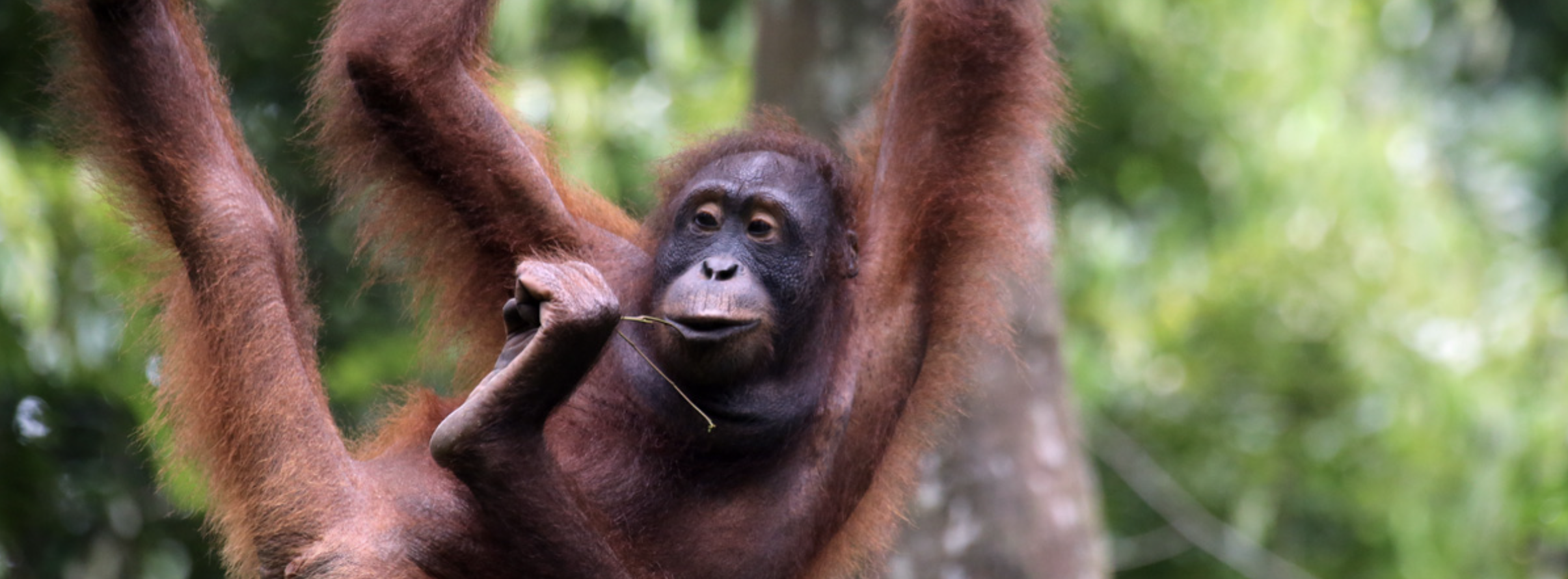
Borneo orangutan at Sepilok Rehabilitation Center in Sabah, Borneo. Image by Rhett A. Butler.
- Deforestation within a pulpwood concession that overlaps with key orangutan habitat in Indonesian Borneo has escalated in recent months.
- Concession holder PT Mayawana Persada cleared 14,000 hectares (34,600 acres) of forest between January and August, or 40 times the size of New York’s Central Park, of which 13,000 hectares (32,100 acres) were areas identified as orangutan habitat.
- In July alone, the company cleared 4,970 hectares (12,300 acres), the highest monthly deforestation figure recorded.
BALIKPAPAN, Indonesia — The deforestation rate has surged in a key habitat for Critically Endangered orangutans in Indonesian Borneo, with an area of forest 40 times the size of New York City’s Central Park cleared this year alone, independent monitoring shows.
The habitat overlaps with the pulpwood concession of the company PT Mayawana Persada, which cleared 14,000 hectares (34,600 acres) of forest between January and August this year. That makes the company the largest deforester of any forestry concession holder in Indonesia this year, according to monitoring by the research consultancy Aidenvironment.
In July alone, the company cleared 4,970 hectares (12,281 acres), the highest monthly deforestation figure, and more than the total land area cleared in the concession in the five years from 2016 to 2020. In total, Mayawana Persada has cleared 34,039 hectares (84,112 acres) of forest since 2016 —nearly twice the area of Washington, D.C. — out of its 136,710-hectare (337,818-acre) concession.
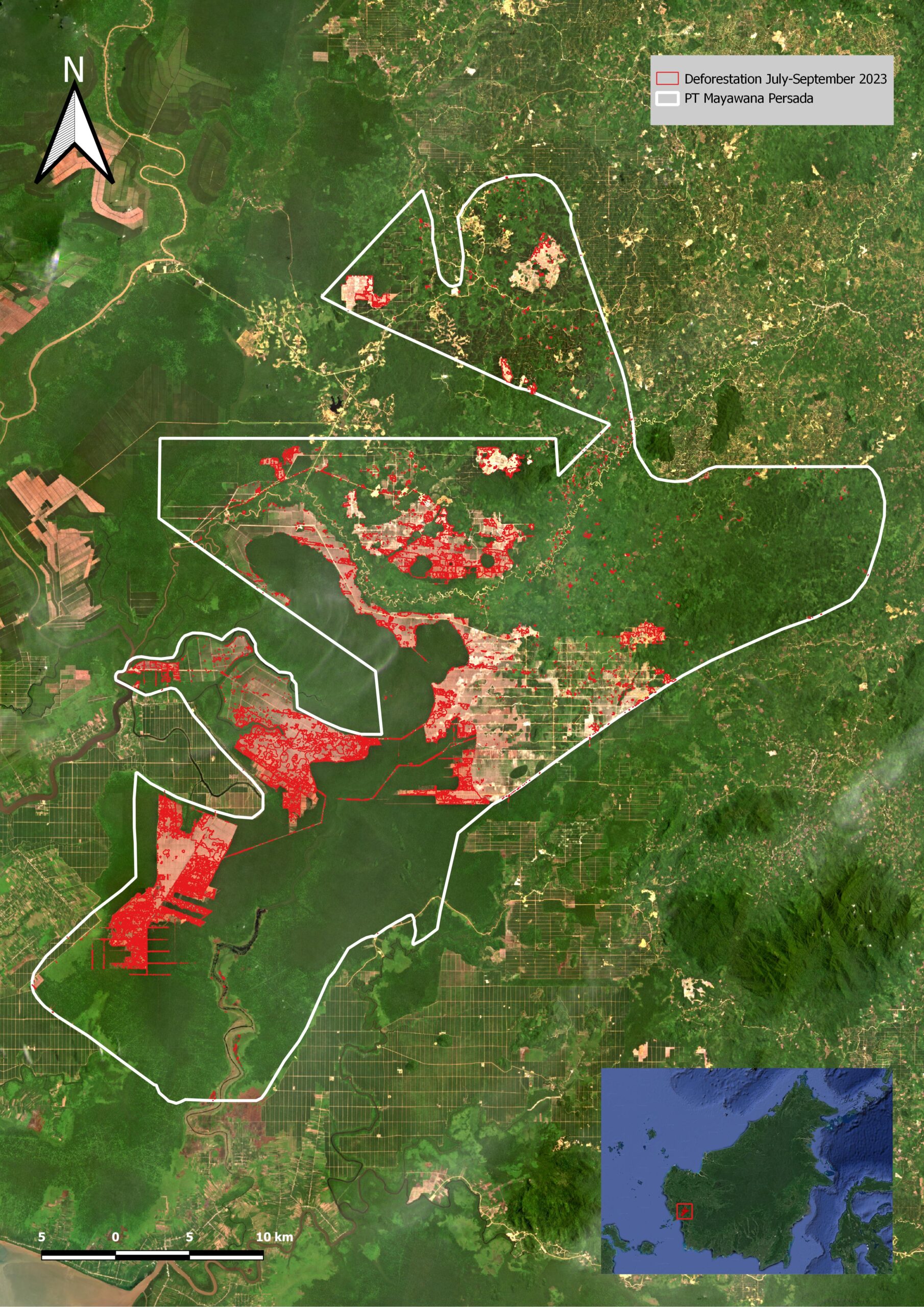
Deforestation within Mayawana Persada’s concession in West Kalimantan from July to September 2023. Image courtesy of Aidenvironment.
Mayawana Persada’s forest clearing has intensified in recent months despite increasing public scrutiny of the concession, which largely overlaps with critical orangutan habitat and carbon-rich peatlands.
Nearly 65% of the concession is officially recognized as suitable habitat for the Critically Endangered Bornean orangutan (Pongo pygmaeus); of the 14,000 hectares deforested this year, 13,000 hectares (32,100 acres) were areas identified as orangutan habitat.
The trend has sparked alarm because the great apes already face “an extremely high risk of extinction in the wild,” said Aidenvironment Asia program director Chris Wiggs.
The Bornean orangutan population has declined rapidly in the past few decades, with nearly 150,000 individuals lost between 1999 and 2015. By 2016, it was estimated that only 57,350 Bornean orangutans remained in the wild.
A 2011 study estimated that between 2,000 and 3,000 Bornean orangutans are directly killed every year, and a new study found they continue to be killed, with 30% of 79 villages across Indonesian Borneo having evidence of killing in the last five to 10 years.
As long as the orangutans continue to be threatened by killing and a shrinking habitat, it’s crucial to preserve the habitat that’s left and stop deforestation within concessions like Mayawana Persada’s, Wiggs said.
“Considering that orangutans are classified as Critically Endangered on the IUCN’s Red List, with a continued declining population trend, it is of utmost importance that we protect remaining orangutan habitat on Borneo, with a focus on halting deforestation,” he told Mongabay.
While an orangutan population estimate for the concession doesn’t exist, there is evidence of the species inhabiting the area, Wiggs said.
The concession is surrounded by areas that are confirmed to have an orangutan presence. It neighbors the 108,000-hectare (267,000-acre) protected area of Gunung Palung National Park, home to an estimated 2,500 orangutans.
To the south of the concession is the Sungai Paduan protected peat forest. The 6,788-hectare (16,774-acre) area consists mostly of peat swamp rainforest and has been identified as one of the pockets of orangutan populations.
All these indicate the presence of orangutans within Mayawana Persada’s concession, Wiggs said.
There are also other factors that indicate the presence of orangutans in the concession, according to the Palung Foundation, an NGO that supports orangutan conservation efforts in Gunung Palung National Park and the Sungai Paduan protected peat forest. For one, 60% of the concession is classified as peatlands. Peat forests are known to be an important habitat for orangutans, as they provide a relatively stable year-round supply of food for the apes.
“I could predict that there are orangutans [in the concession] because it forms a single landscape [with Gunung Palung National Park and the Sungai Paduan forest], and it has peat forests, which are suitable for orangutan habitat,” Palung Foundation field director Edi Rahman told Mongabay.
Palung Foundation workers have also heard male orangutans’ distinctive calls from the direction of the concession while they were conducting surveys in Sungai Paduan, Edi said. The males make long calls to let the females know where they’re located and to warn other males against entering their territory.
The NGO workers also found evidence of other species living in the concession, such as the sound of the Bornean white-bearded gibbon (Hylobates albibarbis), the sight of helmeted hornbills (Rhinoplax vigil), and the claw marks of the sun bear (Helarctos malayanus), all threatened species.
Edi said the workers couldn’t confirm the presence of the orangutan in the concession because they didn’t have access to the area.
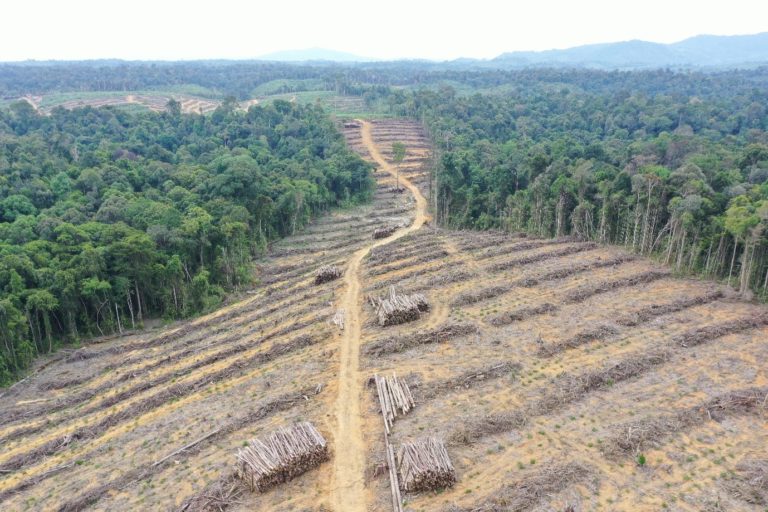
Forest clearing by Alas Kusuma’s PT Mayawana Persada in Kalimantan, Indonesia. Image courtesy of Aidenvironment.
Call for cooperation
The Palung Foundation has sent a letter to Mayawana Persada, inviting the company to cooperate on orangutan conservation across the greater landscape, including the concession, Edi said.
But the company hadn’t responded, he said. A Palung Foundation official visited Mayawana Persada’s office in the city of Pontianak to discuss potential collaboration, but the company official in charge of conservation wasn’t there at the time.
Edi said his staff also attended a conservation workshop held by Tanjungpura University in Pontianak earlier this year, at which a Mayawana Persada representative had been scheduled to speak.
“We thought the workshop was a perfect moment to meet and discuss [with the company], but once we were there, the company didn’t attend [the workshop] even though its management was supposed to be among the speakers,” Edi said.
Collaboration with Mayawana Persada would enable conservation workers to carry out joint surveys of the orangutan population in the concession, he said. That’s important to protect any of the remaining great apes living in the area, which the company is legally required to do anyway, Edi said.
The continued loss of orangutan habitat inside the concession means the apes will have less space to live, roam and look for food, he said.
“When the company clears [forests], some of the wildlife will run [to neighboring forests],” Edi said. “This means that the Sungai Paduan forest will become crowded with orangutans, which could lead to increased conflicts among the apes.”
These neighboring forests might also not have enough food to sustain the orangutan population displaced from inside the concession, he added.
The ongoing deforestation also threatens to cut off corridors that the apes use to move from one area to another, Edi said. At the same time, the clearing will enable greater access for people to enter into the surrounding forests and orangutan habitat that had remained intact so far, he said, putting further pressure on the orangutan population in the Sungai Paduan protected forest.
Besides being a key habitat for orangutans and other wildlife, tropical peat ecosystems play a critical climate role because of the carbon they store: double the CO2 found in all of Earth’s temperate and tropical forests.
Clearing these would ecosystems mean releasing massive amounts of carbon into the atmosphere and accelerating the rate of global warming, Wiggs said.
Peatlands also play a crucial role in water regulation by acting as a sponge, absorbing and retaining excess water and reducing the risk of downstream flooding.
“Thus, safeguarding remaining peatlands, especially those with substantial peat domes, is not only essential for preserving biodiversity but also for shielding human communities against flooding events and mitigating climate change by sequestering carbon,” Wiggs said.
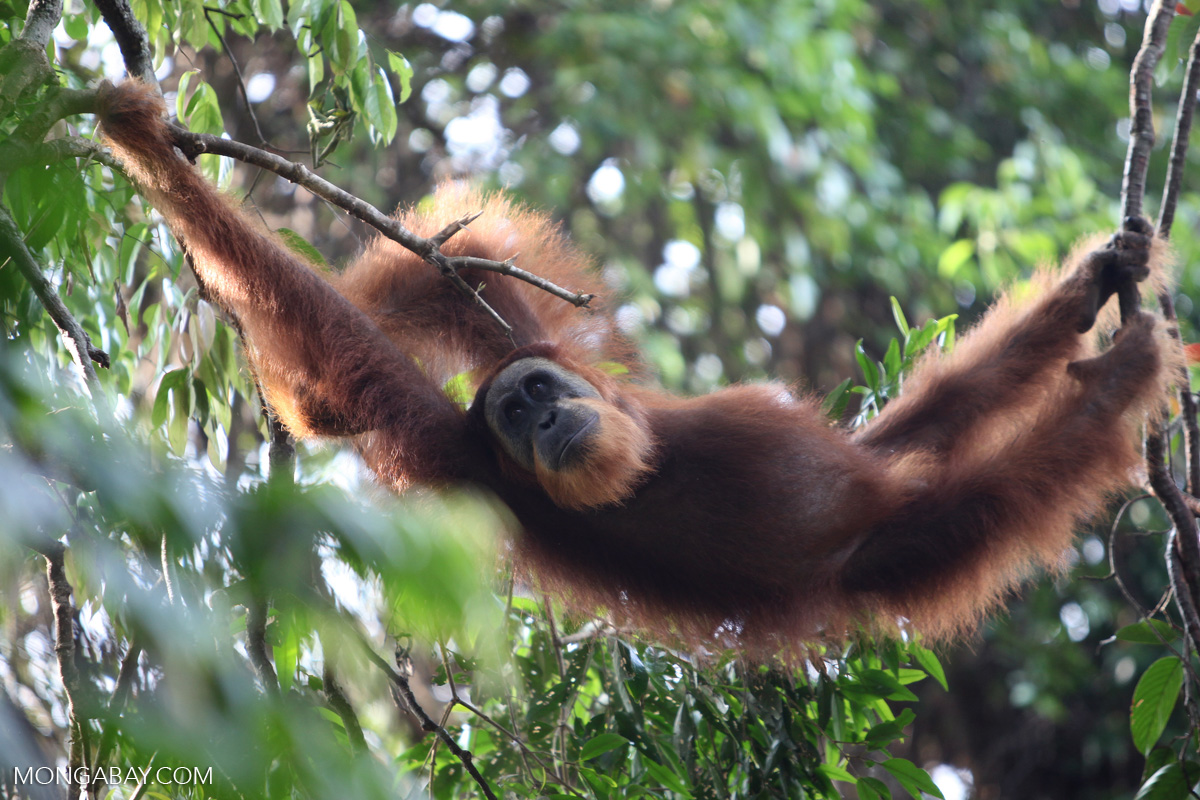
Both intact and logged forests are important habitats for Borneo’s population of orangutans. Image by Rhett A. Butler/Mongabay.
Indigenous lands
Mayawana Persada’s pulpwood concession also overlaps with the ancestral territory of the Indigenous Dayak community of Kualan Hilir, rights activists say. According to Indonesia’s main alliance of Indigenous peoples, AMAN, the concession occupies 3,650 hectares (9,019 acres) of Dayak territory.
Fransiskus Padma, an Indigenous activist at AMAN’s youth wing in West Kalimantan, said the Dayak community has long protected the forest, but is now at risk of losing the rights to its ancestral lands.
“Right now, the Indigenous peoples of Kualan Hilir are under immense pressure,” he said.
Fransiskus said the community met with Mayawana Persada’s representatives on May 11, 2020, during which the company agreed to relinquish part of its concession to the community. The Dayak group also imposed customary sanctions and fines on the company in September 2022.
However, Mayawana Persada ignored the agreement and refused to pay the fines, prompting the Indigenous community to stage a number of protests.
On June 29 this year, local NGO LinkAR Borneo reported that community members blocked a fleet of bulldozers attempting to clear trees in the company’s concession.
With no sign of forest clearance activities stopping anytime soon, Fransiskus said, Mayawana Persada must halt all activities and respect the agreement and the rights of the Dayak people.
“We ask [the company] to immediately get off of [our] ancestral lands,” he said.
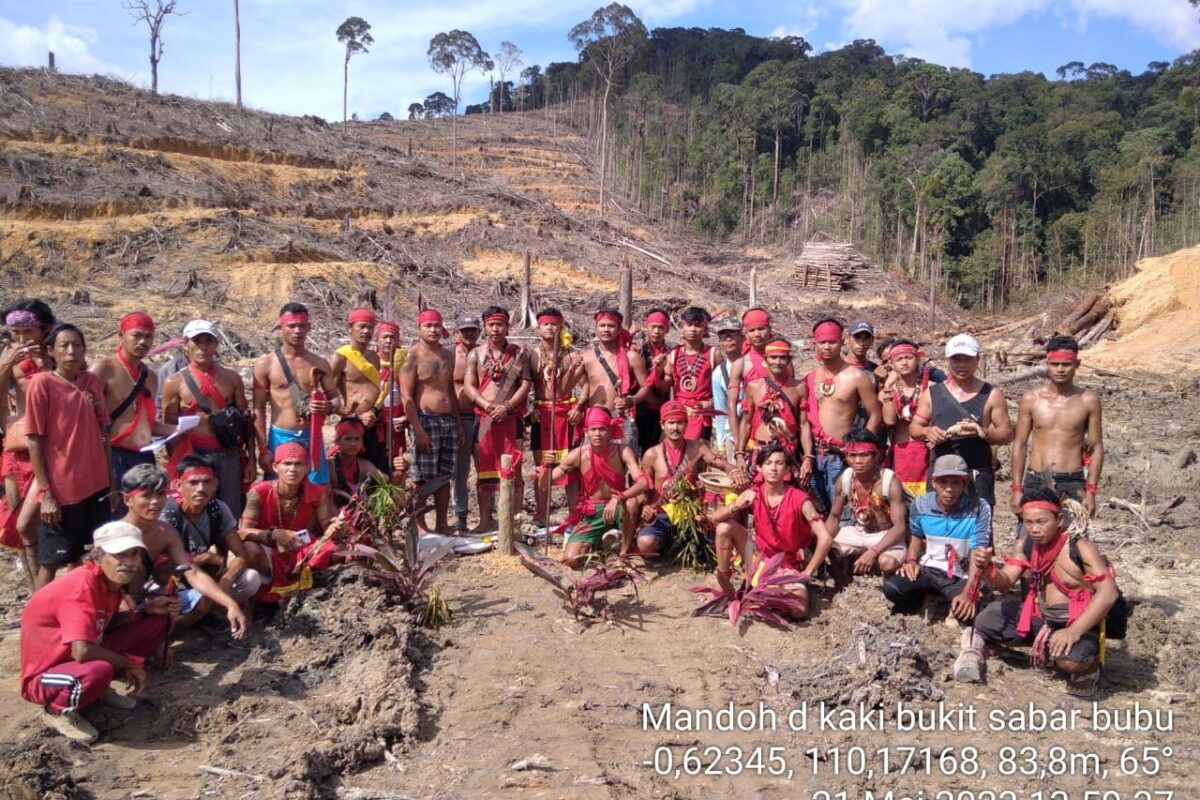
Indigenous Dayak community of Kualan Hilir protests against industrial forest concession Mayawana Persada in West Kalimantan. Image courtesy of AMAN.
Palm oil connection
Mayawana Persada’s concession used to be held by Alas Kusuma, a secretive Indonesia timber and oil palm concession developer. In the latest SPOTT assessment, which evaluates transparency among commodities companies, Alas Kusuma came away with a low score of 14.8%.
The company underwent a change of ownership in January 2023, with 50% of the shares now belonging to a Malaysian holding company called Green Ascend (M) Sdn. Bhd. The remaining 50% of shares remain with Alas Kusuma.
Green Ascend is linked to another Malaysian holding company, Acapalm Plantation, through key personnel.
Acapalm Plantation is itself involved in the management of Nusantara Fiber, which is connected in various ways to Singapore-based paper and palm oil conglomerate Royal Golden Eagle (RGE), owned by Indonesian billionaire Sukanto Tanoto.
RGE’s pulp and paper arm, APRIL (Asia Pacific Resources International Limited), said it had no supplier relationship with Mayawana Persada.
Besides operating the pulpwood plantation in Mayawana Persada’s concession, Alas Kusuma also has a significant footprint in the palm oil industry, with an estimated 12,400 hectares (30,600 acres) of planted oil palms in West Kalimantan.
This means that any buyer of palm oil from Alas Kusuma’s oil palm plantations is also exposed to deforestation from Alas Kusuma’s pulpwood plantation managed by Mayawana Persada, Aidenvironment said. For the buyers, this puts them in violation of their own zero-deforestation policies, also known as “no deforestation, no peat and no exploitation,” or NDPE.
That’s why it’s important to apply NDPE policies at a company-wide level, not at commodity level, since there are cases where companies can still sell palm oil to buyers even though they’re clearing forests for their pulpwood plantations.
Applying NDPE policies at a company-wide level means that palm oil buyers would have to act against companies with a deforestation risk on industrial forest concessions, Aidenvironment said.
It pointed to precedents where palm oil buyers successfully prevented deforestation this way. In 2020, palm oil buyers warned Malaysian company United Malacca that its plan to clear a densely forested area in the central part of Indonesia’s Sulawesi Island would be a violation of NDPE commitments. The warning succeeded, as United Malacca decided to halt forest clearing pending an assessment to identify areas with high conservation value (HCV). To date, clearing has still not resumed.
“Buyers exposed to Alas Kusuma’s deforestation should show a similar level of NDPE policy commitment,” Aidenvironment said.
Citations:
Meijaard, E., Buchori, D., Hadiprakarsa, Y., Utami-Atmoko, S. S., Nurcahyo, A., Tjiu, A., … Mengersen, K. (2011). Quantifying killing of orangutans and human-orangutan conflict in Kalimantan, Indonesia. PLoS ONE, 6(11), e27491. doi:10.1371/journal.pone.0027491
Massingham, E., Meijaard, E., Ancrenaz, M., Mika, D., Sherman, J., Santika, T., … Dean, A. J. (2023). Killing of orangutans in Kalimantan — Community perspectives on incidence and drivers. Conservation Science and Practice. doi:10.1111/csp2.13025
__
"Deforestation surges in hotspot of critically endangered Bornean orangutans" by Hans Nicholas Jong / Mongabay is licensed under CC BY-ND 4.0
